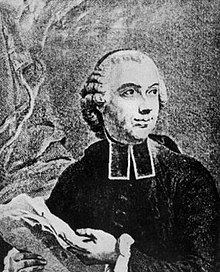Étienne Bonnot de Condillac
French academic
Étienne Bonnot de Condillac (30 September 1714 – 3 August 1780) was a French philosopher.

| This economist article is a stub. You can help out with Wikiquote by expanding it! |
Quotes
edit- It is not true that on an exchange of commodities we give value for value. On the contrary, each of the two contracting parties in every case, gives a less for a greater value. … If we really exchanged equal values, neither party could make a profit. And yet, they both gain, or ought to gain. Why? The value of a thing consists solely in its relation to our wants. What is more to the one is less to the other, and vice versa. … It is not to be assumed that we offer for sale articles required for our own consumption. … We wish to part with a useless thing, in order to get one that we need; we want to give less for more. … It was natural to think that, in an exchange, value was given for value, whenever each of the articles exchanged was of equal value with the same quantity of gold. … But there is another point to be considered in our calculation. The question is, whether we both exchange something superfluous for something necessary.
- Le Commerce et le Gouvernement (1776), as quoted in Marx's Capital, Vol. I, Ch. 5.
- The art of reasoning is nothing more than a language well arranged.
- As quoted in Antoine Lavoisier, Elements of Chemistry (trans. Robert Kerr, 1790), Preface, p. xiv.
- We shall not … begin this logic by definitions, axioms, or principles; we shall begin by observing the lessons which nature gives us.
- The Logic of Condillac (trans. Joseph Neef, 1809), "Of the Method of Thinking", p. 3.
- The tone in which an Englishman expresses anger would, in Italy, be only a mark of surprise.
- As quoted in David Booth, The principles of English composition (1831), p. 8.
- Our ideas are transformed sensations.
- As quoted in Treasury of Wisdom, Wit and Humor, Odd Comparisons and Proverbs (1878), p. 204.
External links
edit- Étienne Bonnot de Condillac, An Essay on the Origin of Human Knowledge, Being a Supplement to Mr. Locke's Essay on the Human Understanding, Translated by Thomas Nugent (London: J. Nourse, 1756)